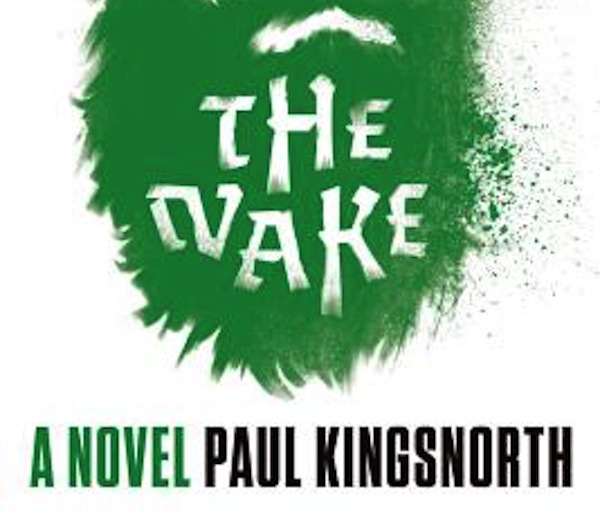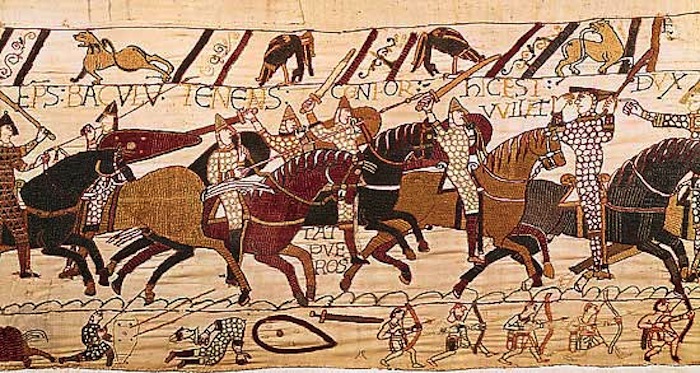Book Review: “The Wake” — When England Stopped Being English
More than a mere novel, The Wake is really a medieval epic poem to an English way of life that would be erased forever.
The Wake by Paul Kingsnorth. Graywolf Press, 384 pages. $16.

By Thomas Filbin
In 1066, William, Duke of Normandy, invaded England, and it is not too bold to say that this was the end of the traditional English way of life and the beginning of something else. Not only did the kingship and governance change, but also the official language, land ownership, laws and customs, and the very cultural and social structure of daily existence.
It did not sit well with everyone, and after initial acquiescence by the English nobles and freemen, a resistance, an insurgency if you will, began with armed bands of patriots taking up the offensive, and which took years of French military action to quell. Battles were fought and villages burnt to enforce Norman control, and in an attempt to obtain horizontal collaboration, French noblemen married the widows of deceased English lords and the daughters of ones who had fled after the battle of Hastings. These semi-voluntary marriages were one way of adding some veneer of legitimacy to the taking of English land. The natives were not only subjugated but dispossessed of their holdings, no longer allowed to work them as true freemen, but bound to overlords. The court language was French for almost three hundred years, and England as it had been for the first millennium of the Christian era was dead and buried. One resisting English nobleman was blinded, then hanged for going back on his oath of allegiance to William. The Normans could go badass quickly when opposed.
The perceived injustice of the invasion and Normanization of England found its way into legend and literature. The origins of Robin Hood go back to the early years of Norman rule, and Walter Scott’s Ivanhoe explored the subsequent dual culture of the island.

Author Paul Kingsnorth — Reading his new novel is akin to listening to Shakespeare for the first time.
Paul Kingsnorth has undertaken a novel about the Conquest that is quite bold in its conception; he writes in what he calls shadow Old English (OE), which he explains in an afterword is not OE, but “a pseudo-language intended to convey the feeling of the old language by combining some of its vocabulary and syntax with the English we speak today.”
In justifying the challenge of writing and reading this language, Kingsnorth argues that he doesn’t “get on with” historical novels that are written in contemporary language. He says the way we speak is specific to our place and time, and that “to put 21st-century sentences into the mouths of eleventh century characters would be the equivalent of giving them iPads and cappuccinos: just wrong.”
Gore Vidal and Hilary Mantel, writers of historical fiction filled with characters who speak more as we do today, would counter that by saying that whatever language of the eighteenth, fourteenth, or eleventh centuries sounds like to us, to people of the time it rang the way colloquial speech of our day does to our ears. But this is an debatable point which does not diminish The Wake’s accomplishments: taking a foreign place and time and using a unique medium to convey the sense of that era vividly. It is brave for a writer and publisher to dare this kind of book in a marketplace that seems ever more bent on simple plots and simpler narrative. It is, to be sure, demanding for the reader, but not a chore. Reading it is akin to listening to Shakespeare for the first time; initially it is a foreign tongue, but soon it drifts into our comprehension as we catch the rhythm and flow, suddenly understanding what seemed at first mysterious.

A section of the Bayeux Tapestry depicting William’s invasion
The story begins when buccmaster, a free tenant farmer in the eastern section of the Danelaw, Lincolnshire in this case, hears of the death of King Harold (harold cyng) and the consequences of Norman rule. This means he no longer owes allegiance directly to the king (with its ironic guarantee of independence), but is now subject to an intermediary nobleman. His position in society has changed: from being a member of the upper-middle-class with its privileges he is now essentially n a serf. Finding a few others willing to take up arms to preserve their rights and place in society, buccmaster becomes part of a group of guerilla fighters. The narrative voice of buccmaster continually cites his English heritage and history as evidence of his very identity. In recalling his grandfather, he thinks of
Tales he wolde tell me of many thinghs, of the great scips he seen cuman in from the sea with the wilde denes all afyr callan for the blud of their gods. Of eald aethelred cyng he who broc us of the great death at maldon the sea drunken with anglisc blud. Of cnut who was denisc then becum anglisc. the duc of the frenc belyfs he is triewe cyng of the anglisc
Resistance to the Normans is not a mere personal quest for buccmaster, but a duty to preserve Englishness. The fight is just as much against English acquiescence as Norman oppression. At one point buccmaster kills a village leader who refuses to support him and then demands food from villagers who have submitted to Norman rule. As much outlaw as rebel, we see that buccmaster’s quest is doomed, but his heroic taking up of the banner arouses our sympathies, although in his heart of hearts even he knows time cannot be reversed. In a lament he says,
now listen I saes listen angland is bean cwelled all ofer by ingegnas (foreigners) while thu is singan and drincan. Does thu thinc this is good does thu thinc this is right thy anlisc cyng harald godwineson and all his thegns was cwelled by ingengas or loand was toc and all things anglisc now they is goan up in fyr. These castels is bean put up with frenc cnights in them anglisc gold is bean tacan to the frenc lands all things we had was gan our children will haf frenc names they will spec frenc words all that we is is bean tacan from us.
By the end of the book you will either think that Kingsnorth is a genius or has taken leave of his senses. For me, the challenging prose stylization succeeds admirably. The flavor and aura of being under an oppressor’s boot is evoked with a powerful eloquence, a brusque beauty, that moves and convinces. More than a mere novel, The Wake is really a medieval epic poem to an English way of life that would be erased forever.
Thomas Filbin has reviewed books for newspapers, literary quarterlies, and academic journals. He lives in Westwood, MA.
Tagged: Graywolf Press, historical fiction, Paul Kingsnorth., The Wake
